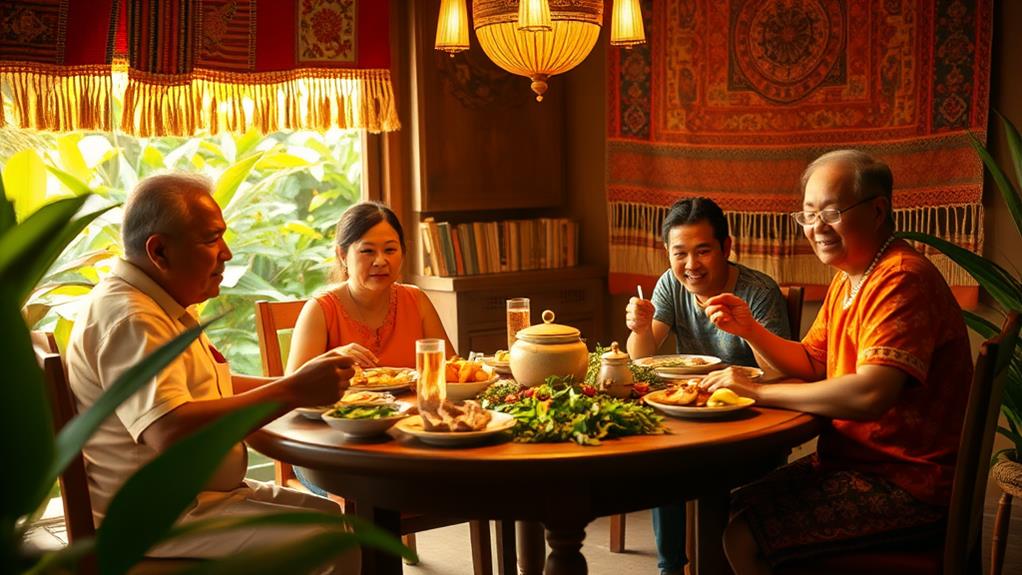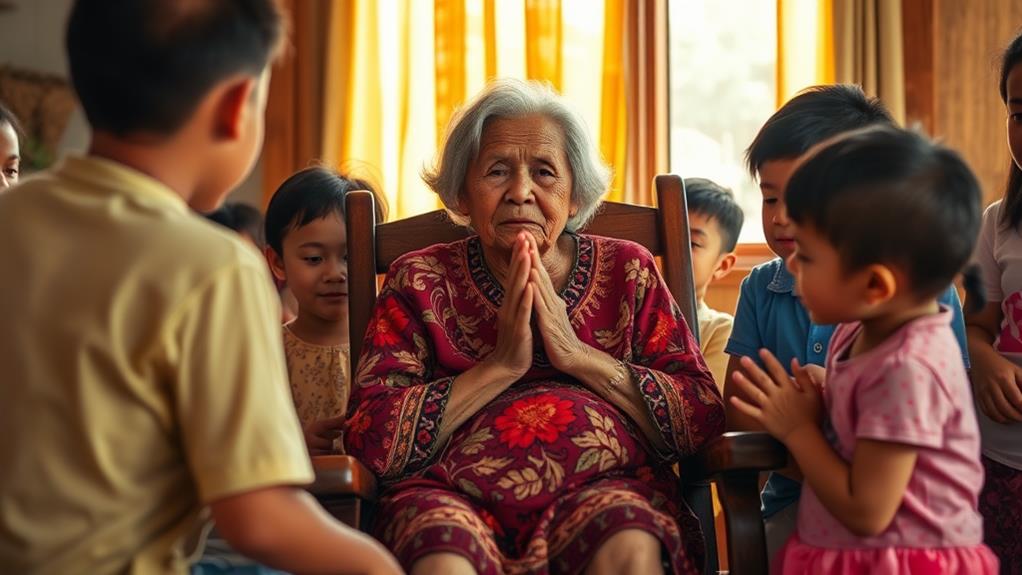Family is the foundation of Filipino society, with a strong focus on loyalty, obligation, and interdependence among family members. This sense of interconnectedness is captured in the concept of "kapamilya," which prioritizes family ties over individualism.
Filial piety is deeply ingrained, instilling respect and care for elders, who are revered for their wisdom and guidance.
Family gatherings and celebrations, such as Noche Buena, are an integral part of Filipino culture, strengthening family bonds and preserving cultural traditions. These events bring together extended families, foster a sense of community, and pass down customs from one generation to the next.
The influence of the family extends beyond the household, shaping social structures, community cohesion, and cultural values.
The family's role in Filipino society is multifaceted, with far-reaching implications for social norms, education, and economic development.
Understanding the dynamics of Filipino families is essential to uncovering the complexities of this vital institution and its profound impact on society.
Foundations of Filipino Family

The foundation of a Filipino family is built on a strong sense of loyalty and obligation to one another. This emphasis on interconnectedness over individualism is reflected in the term "kapamilya," which highlights the importance of family ties.
As a member of a Filipino family, you're expected to prioritize the needs of your family members, particularly your elders, as a sign of respect and gratitude. This is rooted in the cultural value of filial piety, where younger generations are expected to care for and show respect to their elders.
The concept of Utang na loob, or repaying kindness and support, further reinforces this sense of mutual obligation among family members. For example, if a family member helps you with a problem, you're expected to return the favor in the future. This sense of reciprocity strengthens family bonds and encourages cooperation.
Family gatherings and celebrations, such as birthdays and holidays, are crucial in strengthening family bonds and traditions. During these events, families come together to share meals and experiences, fostering a sense of closeness and togetherness.
For instance, during holidays like Christmas, Filipino families often gather together for a meal called "Noche Buena," which is a time to bond and create lasting memories.
Extended Family and Kinship
In Filipino culture, family extends beyond the nuclear unit to include a vast network of relatives. This concept of "kapamilya" encompasses grandparents, aunts, uncles, cousins, and even distant relatives, fostering a strong sense of belonging and solidarity. Family relationships are deeply valued and nurtured, with loyalty and obligation towards extended family members being paramount.
Three generations often live together in Filipino households. Grandparents play a significant role in raising their grandchildren and providing support to the family unit. This setup allows for shared experiences and collective identity within the extended family network.
For example, grandparents may help with childcare, cooking, and household chores, while also passing down cultural traditions and values to younger generations.
Extended family members are a crucial support system in times of need. Filipino families often rely on one another for emotional support and financial assistance. In times of crisis, extended family members may provide temporary housing, food, or financial aid.
This support system is critical in Filipino society, where family ties are deeply valued and nurtured.
Respect and Filial Piety

Respect and Filial Piety Strengthen Filipino Family Bonds
In Filipino culture, respect and filial piety are essential values that fortify family relationships. Filial piety, or respect for one's parents and elders, is a core value that emphasizes the duty and obligation of younger family members to care for their aging relatives.
This value is reinforced through cultural practices, such as celebrations that honor parental figures and ancestors. For example, the Filipino tradition of "Araw ng mga Ama" (Father's Day) and "Araw ng mga Ina" (Mother's Day) highlight the importance of gratitude and reverence for family lineage.
The concept of Utang na loob, or the debt of gratitude, also underscores the expectation to repay good deeds within the family. This showcases the interconnectedness and loyalty inherent in familial relationships.
For instance, children are expected to care for their aging parents in return for the sacrifices their parents made for them.
Respect for elders is deeply ingrained in Filipino society, leading younger generations to prioritize the well-being and care of their grandparents and parents as a sign of honor.
This emphasis on filial piety ultimately reinforces the importance of family ties, solidifying the role of family as the cornerstone of Filipino society.
Family Roles and Dynamics
In Filipino households, a complex web of relationships and roles shapes family dynamics.
Three generations often live together, with grandparents playing a significant role in raising their grandchildren. This emphasizes the importance of extended family dynamics, where grandparents are involved in childcare and decision-making.
The eldest male typically holds authority, while matriarchs manage household income and decision-making. This blend of traditional and modern gender roles showcases the evolving nature of family dynamics in Filipino culture.
Filial piety, a core cultural value, expects younger family members to show respect and care for their elders. This reinforces interdependence within family units, where family members rely on each other for emotional and financial support.
Family gatherings are frequent and significant, serving as opportunities to strengthen bonds and reinforce cultural traditions. These gatherings often involve large family meals, celebrations, and storytelling, which help to pass down cultural values and traditions to younger generations.
The concept of Utang na loob, or debt of gratitude, fosters mutual support and loyalty among family members, creating a system of accountability and interconnectedness within familial relationships. This concept emphasizes the importance of reciprocity and gratitude in family relationships, where family members feel a sense of obligation to support and care for one another.
Celebrations and Gatherings

Celebrations and Gatherings Reinforce Family Ties and Cultural Heritage
In the Philippines, frequent family gatherings and celebrations play a vital role in strengthening kinship ties and preserving cultural heritage. Birthdays, holidays, and milestones are significant events that bring families together, fostering a sense of unity and togetherness. During these gatherings, food is a central element, symbolizing the bond between family members as they share meals and celebrate their connections.
Extended family members often participate in celebrations, emphasizing the importance of collective identity and the interconnectedness of all relatives. Traditional Filipino celebrations may include cultural rituals and practices that honor ancestors and parental figures, reflecting gratitude and respect within the family lineage.
For example, the "Pagluluksa" ritual is a traditional Filipino mourning practice that honors the deceased and provides comfort to the grieving family.
These gatherings not only strengthen family ties but also serve as opportunities for cultural transmission, ensuring that values and traditions are passed down through generations. By participating in these celebrations, individuals actively reinforce familial bonds and perpetuate Filipino culture.
How does the Filipino value of respect for elders contribute to the importance of family in Filipino society?
In Filipino society, the Filipino value of respecting elders plays a crucial role in upholding the importance of family. This value fosters strong family bonds, promotes intergenerational harmony, and instills a sense of responsibility in caring for elderly family members. It ultimately contributes to a cohesive and supportive family unit.
Impact on Society and Culture
Family Ties Shape Filipino Society and Culture
The strong familial bonds in Filipino families have a profound impact on social structures, fostering cooperation, mutual aid, and community cohesion.
The family serves as a cornerstone, shaping cultural values and norms.
Cultural Values and Their Impact
Pakikisama and Bayanihan, which emphasize social harmony and collective support, demonstrate the family's influence on community dynamics.
These values promote unity and cooperation among family members and the community.
Utang na loob and Hiya, which cultivate a sense of accountability and social responsibility, reflect the family's significant impact on societal behavior and norms.
These values encourage family members to take responsibility for their actions and respect others.
Close family relationships contribute to social stability and resilience, as families often serve as primary support systems during times of need.
This close-knit structure provides emotional and financial support, helping individuals cope with challenges.
In Filipino society, relationships are highly valued, and a deep sense of family is instilled from a young age.
This close-knit family structure plays a significant role in shaping social norms and cultural identity.
Frequently Asked Questions
Why Is Family so Important in Filipino Culture?
Family is the core unit of Filipino society, and its importance stems from cultural values that prioritize filial piety, respect for traditions, and strong community ties.
In the Philippines, extended households are common, where multiple generations live together, emphasizing interconnectedness and closeness among family members.
Regular family gatherings, such as Sunday lunches and fiestas, reinforce generational bonds and provide opportunities for socialization and cultural transmission.
Filipino families serve as a support system, offering essential care and guidance to their members.
Elderly relatives are often cared for by their children and grandchildren, rather than relying on government support.
By honoring family lineage, Filipinos demonstrate loyalty and a sense of belonging, which ultimately strengthens their cultural identity.
This strong sense of family ties is a defining characteristic of Filipino culture.
What Is Meant by the Family Is the Cornerstone of Society?
The family is the cornerstone of society because it provides the foundation for social structures to thrive. This means that strong family bonds and cultural values are essential for fostering social support and communal responsibility.
For instance, family traditions such as regular dinner gatherings and resilience strategies like open communication help promote social cohesion.
In essence, a strong family unit serves as the bedrock for a stable and harmonious society, where individual and collective well-being are interconnected.
Who Is the Cornerstone of the Family?
The Matriarch: The Cornerstone of the Family
She holds key family roles and exerts significant parental influence. The matriarch, typically the grandmother, takes on crucial responsibilities within the family structure. For instance, she often provides guidance and support to younger generations, helping to shape their values and beliefs.
She is the hub of sibling dynamics and extended family relationships. The matriarch plays a vital role in maintaining harmony among siblings and uniting extended relatives. Her efforts help to strengthen family bonds and resolve conflicts.
She upholds cultural traditions and provides emotional support. By preserving cultural heritage, the matriarch offers a sense of continuity and belonging.
Her wisdom and care also create a sense of security, making her the epicenter of the family's support system.
What Is the Family Structure of the Philippines?
The typical family structure in the Philippines is a blend of nuclear and extended families. This bilaterally extended family system often includes three generations living together, with a clear family hierarchy.
The family hierarchy is characterized by a strong sense of respect for elders, with traditional cultural traditions emphasizing their authority and wisdom.
Strong kinship ties extend to aunts, uncles, and cousins, creating a close-knit support network. For instance, it's common for cousins to be considered as close as siblings, and aunts and uncles to take on a parental role when needed.
Family gatherings are an essential part of this structure, fostering unity and cooperation among members. These gatherings often involve large family reunions, celebrations, and special events, which help to strengthen family bonds and reinforce the importance of family relationships.